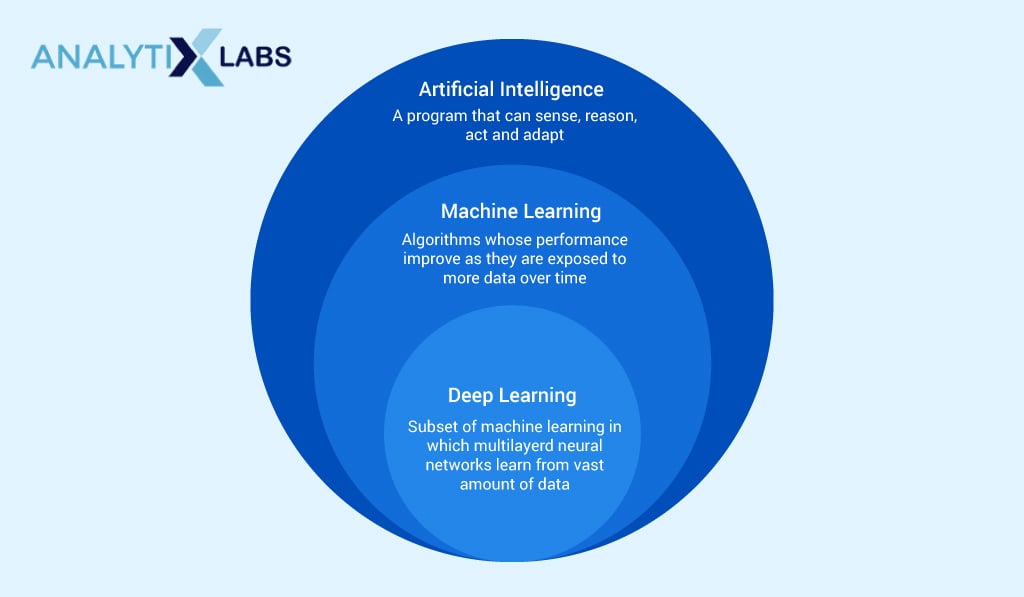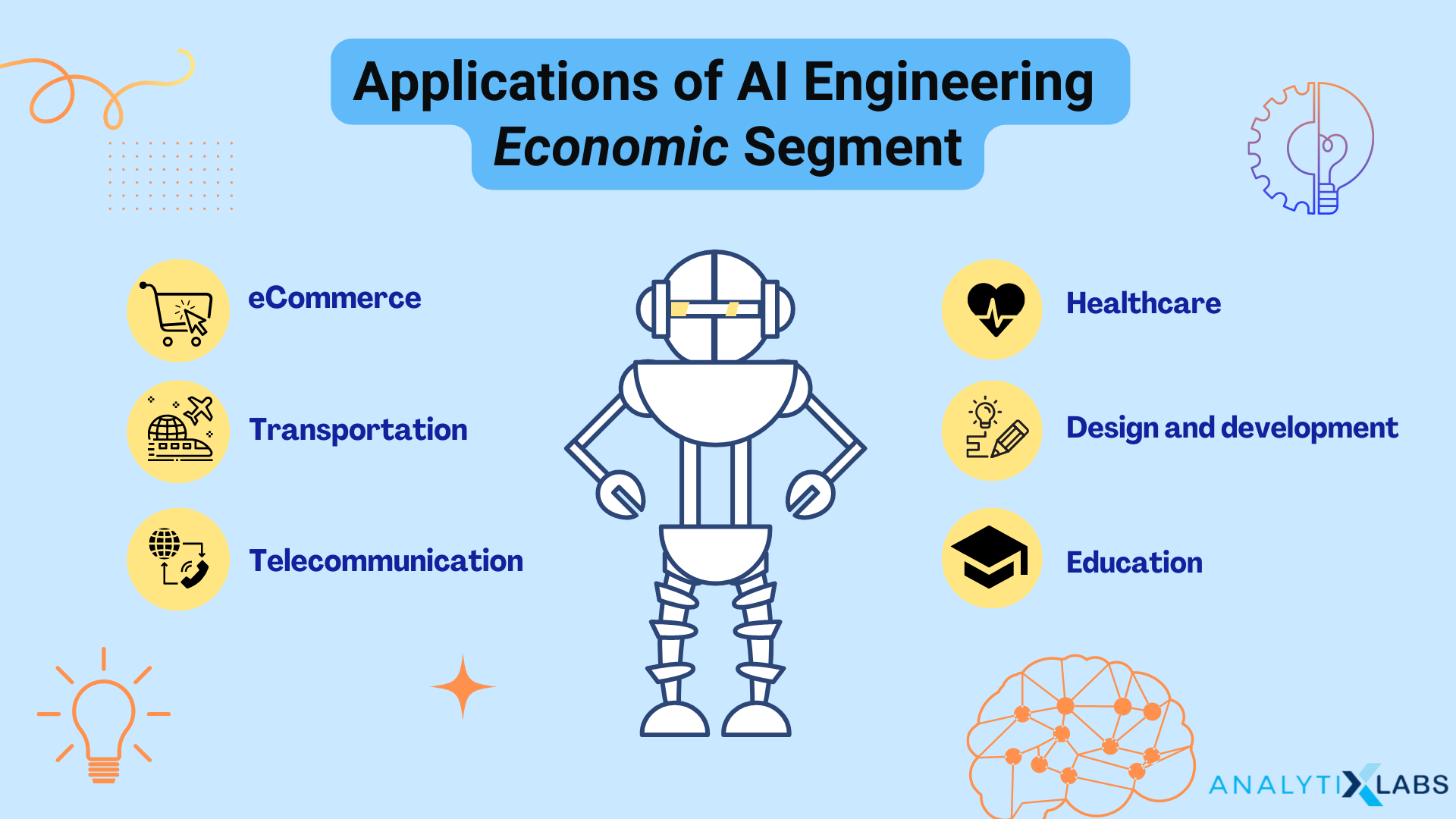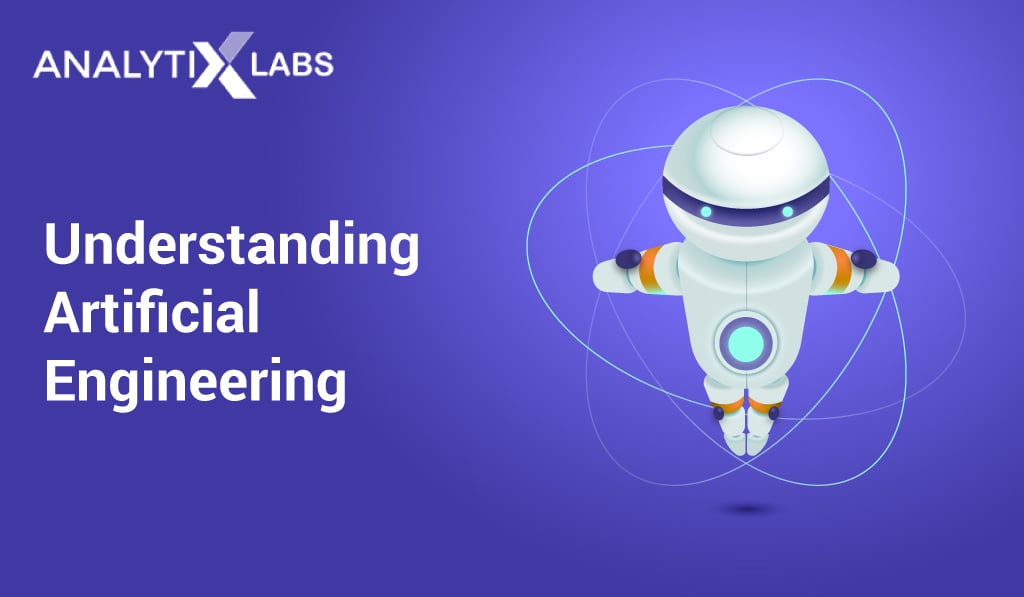Want to pursue artificial intelligence engineering? Well, your timing is just right!
Read our detailed guide on the steps to becoming an AI engineer. If you are looking to understand what is the hype around AI engineering, then read on.
Artificial Intelligence has come a long way already. There is hardly an industry that is not leveraging the powers of AI, and why not. AI has revolutionized how we live and work. Every day, AI hits the headlines for all good reasons. If you are unable to fathom the relevance and importance of AI, here are some fascinating facts –
- Banks worldwide are looking to invest another $31 billion in AI to reduce frauds
- The Indian army has deployed around 140 AI-based surveillance systems to keep an eye on China and Pakistan
- AI is all set to give drug discovery a giant leap
- Meta’s BlenderBot, a unique chatbot, begins its beta testing
- AI is powering and revolutionizing content writing – special mention: Writesonic app that can write amazing content for you
AI has an umbrella model that includes machine learning, deep learning, and artificial neural networks.
- Machine Learning(ML): ML enables software to predict outcomes with maximum accuracy without any programming or intervention.
- Deep Learning (DL): DL is a type of AI and ML that learns to imitate how humans acquire knowledge about certain things.
- Artificial Neural Networks (ANN): ANN is an attempt to replicate the network of neurons in a human brain to enable a computer in acquiring, thinking, and making decisions like a human with much precision. It is done by programming computers to behave like interconnected neurons.
Also read: Understanding Perceptron: The founding element of Neural Networks

Now, let’s address the elephant in the room.
What is artificial intelligence engineering?
Artificial intelligence engineering is an amalgamation of the concepts of engineering systems, software engineering, computer science, and human-centered AI. It is a specialized domain within computer science engineering that focuses on the utilization of intelligent models, processes, and algorithms in the practical domain. This genre of engineering is centered around three cornerstones.
- Human-centered AI: The first cornerstone is called human-centered artificial intelligence. This subdomain of artificial intelligence involves a deep understanding of the impact of technology on the lives of people. It aims to design and develop technology that is aligned with the behavior and needs of human beings.
- Scalable AI: The second cornerstone of artificial intelligence is scalable AI. This subdomain of artificial intelligence looks at the market dynamics of technology. It focuses on making large investments in infrastructure and models that are powered by artificial intelligence. Scalable AI is about orienting the growth of artificial intelligence along economic lines. As such, this type of artificial intelligence is an ideological apparatus of the capitalistic model and Laissez-faire system.
- Secure AI: The third cornerstone of artificial intelligence engineering is called secure AI. Securing artificial intelligence can itself be divided into explainable AI, trustworthy AI, responsible AI, and ethical AI. This subdomain primarily concerns itself with the security and privacy aspect of artificial intelligence engineering. It puts a lot of trust in governance with respect to the deployment of AI models and systems.
Applications of Artificial Intelligence Engineering
The practical applications of artificial intelligence engineering can broadly be studied under three major segments. These include the social segment, the economic segment, and the technological segment.
1. Social Segment
In the social segment, the concept of artificial intelligence engineering is applied to improve social interaction and connect different people across the world within a single consolidated interface.
One of the best examples of this is provided by metaverse. This technology makes use of artificial intelligence and other sister technologies like virtual reality, augmented reality, and mixed reality. With the help of this technology, people can connect to each other irrespective of time and space. Metaverse has been popularly referred to as the virtual reunion with all our loved ones.
Several companies have their own version of the metaverse. One of them is Mark Zuckerberg’s Facebook which rebranded itself as Meta. In an open letter, Zuckerberg explained the future of Meta – the company will become a meta-first company which means soon people will not need a Facebook account to use the services in the Metaverse. Hear Mark Zuckerberg throw more light on how you might use Metaverse one day.
To take Metaverse to the next level, the power of artificial intelligence engineering is used to create digital avatars of humans who live in different parts of the world. It is also possible to create digital avatars of those who have passed away.
However, this can happen if all the corresponding ethical challenges are overcome in the times to come. Some firms in Singapore have already received the approval to go ahead with the creation of virtual avatars of the dead using artificial intelligence and virtual reality.
2. Economic segment: The intelligent fulcrum of the market
In the economic segment, artificial intelligence engineering is providing a new lease of life to the market dynamics. It is able to predict the pulse of the market. This is very helpful for the stock exchange and related services. Predictive analytics helps in predicting the rise and fall of shares as well as their corresponding values.

The application of artificial intelligence in the domain of e-commerce is phenomenal. It helps in predictive analytics, customer recommendation, customer targeting, and even personalization of content according to the preferences of the client.
Artificial intelligence engineering is also the science behind natural language processing and chatbot technology that is popular in the telecommunication sector.
In the domain of transportation, artificial intelligence not only powers self-driving cars but also has the potential to make the concept of flying taxis very real in the times to come. The manufacturing sector is undergoing a revolution with the help of artificial intelligence and this task is being accomplished because of the automation of different processes.
The design and development of products are now carried out by 3D printing and related technology like personalized fabrication.
In the education sector, Artificial Intelligence engineering is the technology that is at the core of augmented learning platforms. Student assessment systems, as well as performance metrics, are being mined out with the help of machine intelligence. This gives the overall track record of the student and suggests ways to improve student performance.
In the domain of healthcare, artificial intelligence is helping in the performance of robotic surgeries and even suggesting appropriate elements of telemedicine. It is also helping in the diagnosis of diseases with a lot of precision. Artificial intelligence has also influenced the logistics sector by ensuring robust interconnectedness in this domain.
3. Technological segment
In the technological sector, artificial intelligence engineering is heralding a new revolution in the form of quantum computing, cloud computing, and advanced analytics. The director of the World Economic Forum has presented a detailed account of the changes in the technologies that are powered by artificial intelligence in his masterpiece titled “The fourth industrial revolution “.
In addition to this, artificial intelligence is also helping businesses in quantitative decision making and this sector is being serviced with the help of a newly emergent stream of artificial intelligence called decision science. Other technological applications of artificial intelligence are related to human-computer interaction and computer vision. It is this field that is carrying out research and development related to robotics, humanoids as well as social humanoids.
Artificial Engineering in India
The domain of artificial intelligence is regarded as a sunrise discipline of engineering science. This means that artificial intelligence has tremendous potential to develop into a full-fledged branch of engineering and overshadow computer science engineering in the future.
The growth in the number of Artificial Intelligence Engineering colleges in India is a testimony of the educational and economic viability of such a new genre of engineering in India. The institutes of national importance in the country have slowly started to shift their focus to ai engineering. Most colleges have integrated artificial intelligence within their core engineering branches because the interdisciplinary nature of the artificial intelligence engineering syllabus allows its integration with other engineering programs.
AI Engineer Role and Responsibilities
The role of an AI Engineer is vast and multifaceted. AI engineers assume a central place in the modern economic system given their proximity to business and technological sectors.
The role of an AI Engineer can be condensed into the following broad dimensions:
- The application of principles of artificial intelligence engineering in different environments to develop prospective products.
- The analysis of voluminous amounts of data, reconstruction of images, and examination of semantic variables to mine and retain valuable information stacks and discard redundant ones.
- Deriving solutions to real-world complex problems by implementing machine learning and deep learning techniques.
- Automation of various types of business processes by developing platforms and services powered by artificial intelligence.
- Build, maintain and deploy AI models and systems as well as other types of software products.
- Working with other teams for monitoring, testing, development, and integration of feedback systems based upon AI algorithms.
Skills required to be an AI engineer
- The first and foremost skill required to become an AI Engineer is programming. R, C, C++, Python, and Java are the most prominent programming languages.
- In addition to this, mathematical skills like statistics, calculus, and linear algebra form the lingua franca of artificial intelligence.
- Naive Bayes, Gaussian distribution, and Markov models not only provide theoretical considerations and understanding but also practical experience for AI Engineers.
- Machine learning techniques like supervised learning, unsupervised learning, semi-supervised learning, and reinforcement learning form the lifeblood of any working model powered by artificial intelligence. Understanding of applications of classification, clustering, and regression is necessary to take the concept of an AI model into the practical domain.
- Knowledge about wavelets and curvelets forms the incircle of signal processing techniques that are a must for any AI engineering.
- Skills related to dimensionality reduction enable a person to reduce the complexity of datasets. Another important technique related to feature extraction and engineering involves working on the assigned parameters only with a consolidated data set.
- We often encounter instances and problems where the complexity of the models exceeds our expectations. In such a situation, an AI Engineer makes use of artificial neural networks.
Also read: How to use Naive Bayes Theorem in Machine Learning?
You can enroll in our artificial intelligence course, which will help you master the skills to begin working in the field of AI, get started today with AnalytixLabs, because, trust me, there has never been a better time than today to get into AI.
Current Salary Trends
(as of August 2022)
The salary structure is different across various locations, countries, and continents. In India, an AI engineer can draw between 13L to 14L/year at the beginner’s level. As you gain experience, it can go up to 22L to 30L/year.
There is also a lot of variation in the salary of an engineer who works in the Indian subcontinent and the one who works in western countries like the USA and Scandinavia. The salary for a fresh graduate who knows the basic skills of artificial intelligence ranges between 100000 to 200000 per month. The salary bracket increases considerably for experienced engineers when compared to fresh engineering graduates. In western countries like Sweden, the salary bracket follows an entirely different level for an AI engineer. Glassdoor estimate predicts the salary of an AI engineer working in Europe at about $119,297.
AI Engineering: FAQs
- Which engineering branch is best for Artificial Intelligence?
There is no doubt in the fact that computer science engineering is the parent branch of artificial intelligence. That said, the immense popularity and growth of artificial intelligence in the last 5 years has led to its development as a full-fledged branch of engineering. Various colleges are not only offering post-graduate programs in artificial intelligence but also offering customized courses like a 1-year diploma for working professionals.
- Is Artificial intelligence good in engineering?
Artificial intelligence has not only revolutionized the field of engineering but has led to a rapid technological change in this domain. Engineering is no longer seen as a monopoly of core engineering branches like civil engineering, mechanical engineering, electrical engineering, and electronics and communication engineering. It is in fact believed that artificial intelligence would weave the fabric of innovation and progress in the engineering domain and mark the next phase of engineering science. This would be popularly known by the acronym engineering 2.0.
- Is AI a good career?
A novel manuscript by Carnegie Mellon University titled AI Engineering: 11 Foundational Practices highlights the pilot role of AI in the upcoming digital industrial sectors. It describes how a career in AI engineering would turn out to be a money-spinner for prospective students and professionals. It highlights the widespread applications of artificial intelligence in newly blossoming startups and the role of AI engineers in driving such ventures to the highest pinnacle.
Concluding remarks
The creation of artificial intelligence engineering has blessed machines with immense power. That said, this emerging line of engineering needs to be carefully and cautiously harnessed. Lest the fears of Stephen Hawking about the dominance of man by the machine may even come true.
Related articles to read:








